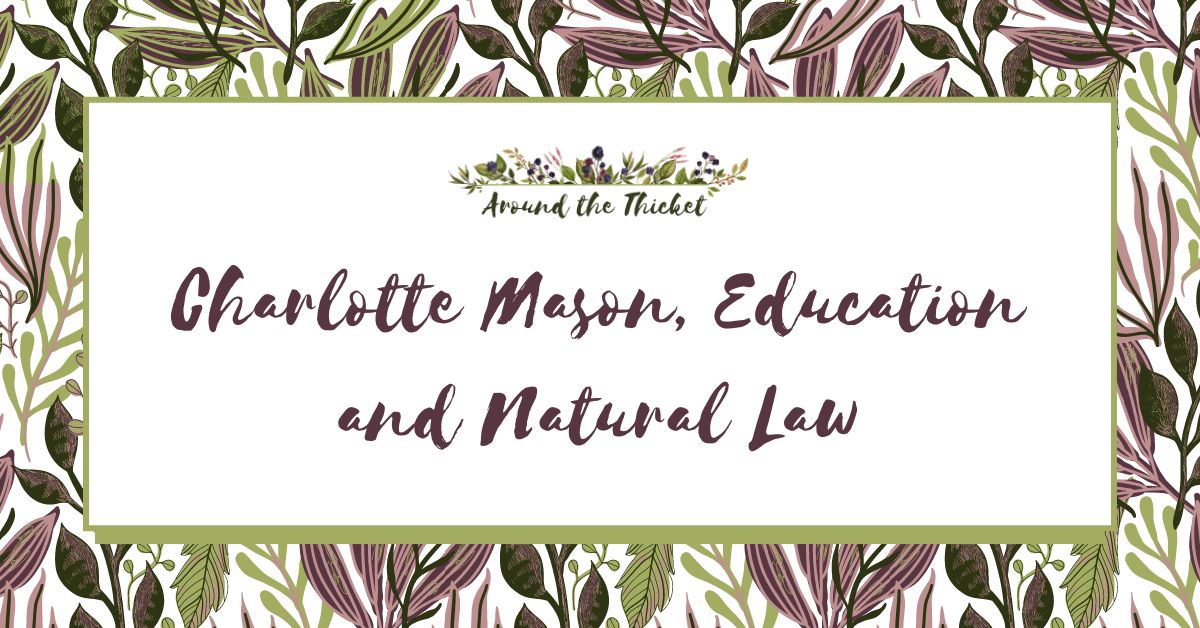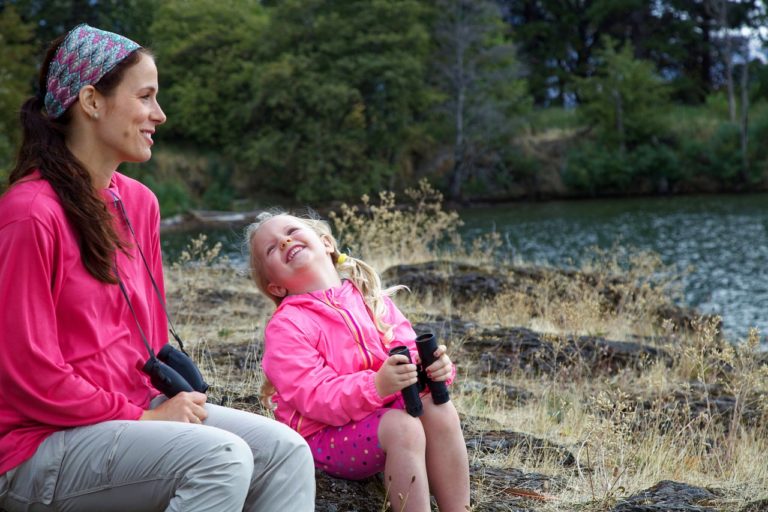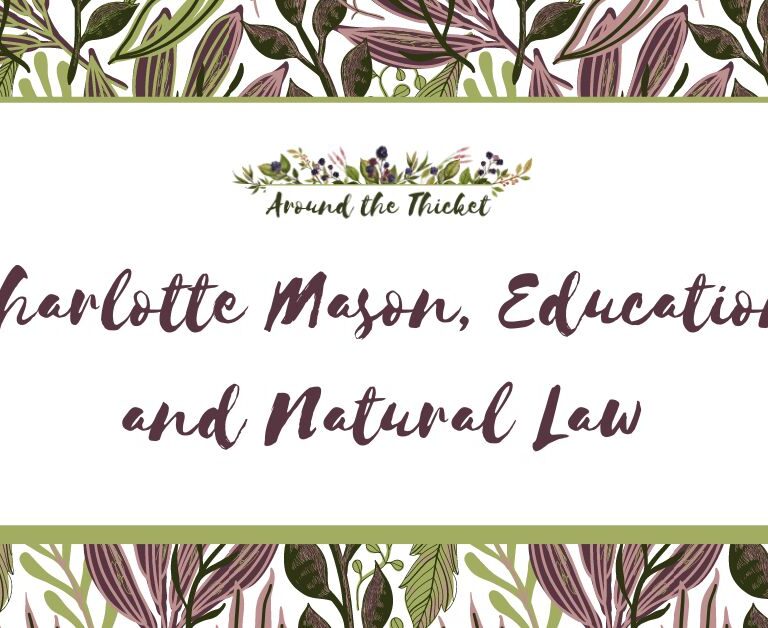Charlotte Mason, Education, and Natural Law
What I desire to set before the reader is a method of education based upon natural law.
Charlotte Mason, Home Education
There is something about Charlotte Mason’s ideas that is extremely intuitive. I don’t think it’s just me, either. Plenty of people find that her principles speak to something that they’ve known, but couldn’t articulate. She put into words so many of the problems with education, and offered an appealing, approachable alternative. Even people who say that they tried the Charlotte Mason method, but no longer follow it, will share how much she resonated with them.
And then there are the people who approach the Charlotte Mason method backward. As in, they start educating their children (or others), and later recognize their approach within Charlotte Mason’s ideas. Again, they find that Charlotte Mason has articulated what they hadn’t quite been able to put into words, yet found to be true from their observation and experience.
I think that Charlotte Mason’s lasting popularity goes beyond hitting upon a few good ideas and writing about them in an appealing way. First, her writing itself is not the easiest to sift through. Second, I can’t imagine that her method would transcend time and culture so easily if she had merely put together “Top Twenty Principles to Educate Your Kids with Ease,” and happened to go viral.
No, her ideas are substantive and I suspect the reason is found in the quote at the top of this post: that she rooted her philosophy in natural law. I’ve been mulling over the meaning and implication of this for a while. I read a book about natural law and got confused. So now I’ve signed up to audit a class through Davenant Institute and am hoping to appreciate more deeply what it means to have an educational philosophy based on natural law.
This week I’m reading about the basics of natural law. The rest of this post is my thoughts and reflections on the readings for the class.
What is natural law?
Charlotte Mason’s references to natural law can slip by pretty easily. In part, we’re often busy looking for the practicalities of her method (how exactly do I teach geography?). But when we do notice it, like in that first quote, tucked from the very beginning of a section on habit training, I think it’s important to question what natural law means in the first place.
Fulford and Haines in Natural Law: A Brief Introduction and Biblical Defense define natural law as:
that order or rule of human conduct which is (1) based upon human nature as created by God, (2) knowable by all men, through human intuition and reasoning alone (beginning from his observations of creation, in general, and human nature, in particular), independent of any particular divine revelation provided through a divine spokesperson; and, thus (3) normative for all human beings.
Personally, I get bogged down by long quotes in articles, so I want to break this down.
“That order or rule of human conduct”
We start by recognizing that we are governed by law in the first place, and there are different kinds. It’s pretty easy to accept that there are laws of physics by which we must abide. It doesn’t really matter if you recognize, believe in, or submit the law of gravity or not, if you jump off the end of a pier, you will hit the water below you.
But natural law isn’t the same as the laws of physics. It relates to human conduct, to the way we behave.
“Based upon human nature as created by God”
God created us with an end in mind, with a purpose and suited to that purpose. We can look at humanity and discern what we are for. That tells us what our nature is.
Fulford and Haines use the example of a refrigerator. We can look at a refrigerator and, without knowing exactly how it works, we can see that it is meant to preserve food by keeping it cold. That is the purpose and nature of a refrigerator. Of course, you can have a bad refrigerator (just like we make our observations from fallen men and women), but you still are able to discern it’s nature and purpose, even if it falls short of that purpose.
“Knowable by all men, through human intuition and reasoning alone”
Here is where some take issue with natural law theory. Specifically, it can be difficult to reconcile natural law theory with Sola Scriptura. However, as Fulford and Haines remind us, Protestants throughout history have accepted natural law, and it’s only relatively recently that people have taken issue with it.
Romans 2:15 helps here: “[The Gentiles] show that the work of the law is on their hearts, while their conscience also bears witness, and their conflicting thoughts accuse or even excuse them…”
So on one hand, we can know the natural law through intuition. Like I mentioned in the introduction, I think this is one reason people are attracted to the Charlotte Mason method. We intuit the problems in education, and perhaps even intuit a better way forward, then we find that she has articulated our intuitions. She has applied reason to intuition and observation.
At the same time, there is such a thing as a science of education, that does not come by intuition, in the knowledge of which it is possible to bring up a child entirely according to natural law, which is also Divine law, in the keeping of which there is great reward.
Charlotte Mason, Home Education
“Normative for all human beings”
I think this is an extremely important point to bring into this conversation. There can be exceptions to the rule, but in general, natural law dictates what is normal for everyone. It is normal for every refrigerator to keep food cold. Some may do this exceptionally well, many will be ok at it. And this variation doesn’t negate natural law, nor does natural law mean that we are all meant to be the same.
There are many people who say that the Charlotte Mason method wouldn’t work for their child. I often wonder if these people are caught up in the practical aspects of the method; after all, I don’t think any of those people would say that their children aren’t born persons, or that education isn’t the science of relations. So by education based on natural law, Charlotte Mason isn’t saying that her method is suitable for every child. But it is, she argues, the best for most.
The Nature of Man
If that’s the definition of natural law, then what natural law governs us as human beings? What are we for?
Fulford and Haines give more insight here. Our nature as humans is what makes us distinct from everything else. And that quality is our ability to reason, which is beautifully tied into the Charlotte Mason philosophy. “The word rational refers to, among other things, the capacity to reason, to consider abstract concepts for the sake of knowing, to deliberate about means to ends, etc.” they write.
This is connected to observations from Aristotle (picked up later by countless others, including Pestalozzi and Miss Mason herself) that as humans, we learn from many specific examples, and use those examples to appreciate patterns, categories, and, eventually, to generalize ideas. This ability to move from the concrete to the abstract is part of what makes humans human.
Natural law and education
When Charlotte Mason says that children are born persons, she is arguing that from birth, babies are engaged in this activity – taking in many, many concrete examples from the world around them, and slowly piecing them together to build abstract ideas. This piecing together is the science of relations – it is education.
To bring this back to the definition of natural law, then, we can appreciate that we can see children as persons and education as the science of relations with out Divine revelation. We can observe it, intuit it, and rationally discern it. As Christians, we recognize that we see this at play because God intended us to be rational creatures, and therefore it is in our design – our nature – to learn in this way.
We can also appreciate that there are bad forms of education because they give general principles before specific examples (they work backward) and they attempt to make the connections for the student rather than allowing the student to do the work that they have been designed for. Likewise, we can see that there are forms of education that not only make room for natural law, but that, by submitting to it, promote human flourishing.
And with that, I am out of time to type up any more thoughts on the reading for the first class!






